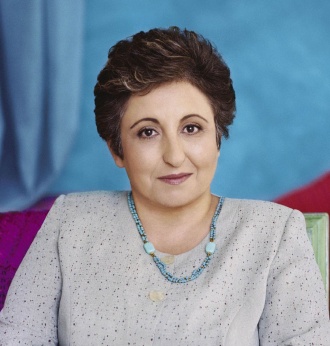
By Azadeh Moaveni
The last time I saw Shirin Ebadi in Tehran, the government devoted at least perfunctory attention to her safety. Two state-appointed bodyguards stood watch outside her house, and even accompanied us to dinner. They carefully looked on as we ate under the stars, interrupted every few moments by effusive Iranians who recognized their country's 2003 Nobel Peace Prize winner and paused to press her hands in thanks.
That was back in 2005, on the eve of the fateful presidential election that brought Mahmoud Ahmadinejad to power. Ms. Ebadi viewed his election with trepidation, nervous that he would reverse the state's tacit tolerance of her work -- the defense of women, children and political dissidents before the Islamic Republic's pitiless courts. Many considered her anxieties exaggerated. But, as in so many cases, her instincts were exactly right.
Last Thursday, local police stood by and allowed a group of "demonstrators" -- most likely thuggish young men dispatched by the regime's hard-line Basij militia -- to attack her home and office. It was the most alarming act of violence the state has permitted against her in nearly two decades of intimidation and threats. In late December, the authorities closed her Center for Defenders of Human Rights on the grounds that it was operating without a permit. Government agents raided her private office, seizing her computers and files. Though the government has long viewed Ms. Ebadi uneasily, it has been forced to abide her in recent years because of the popular base of her support. Until now, the state has bullied her only discretely, and the timing and hostility of the present moves against her say a great deal about both her influence and where Iran stands today. ...
The last time I saw Shirin Ebadi in Tehran, the government devoted at least perfunctory attention to her safety. Two state-appointed bodyguards stood watch outside her house, and even accompanied us to dinner. They carefully looked on as we ate under the stars, interrupted every few moments by effusive Iranians who recognized their country's 2003 Nobel Peace Prize winner and paused to press her hands in thanks.
That was back in 2005, on the eve of the fateful presidential election that brought Mahmoud Ahmadinejad to power. Ms. Ebadi viewed his election with trepidation, nervous that he would reverse the state's tacit tolerance of her work -- the defense of women, children and political dissidents before the Islamic Republic's pitiless courts. Many considered her anxieties exaggerated. But, as in so many cases, her instincts were exactly right.
Last Thursday, local police stood by and allowed a group of "demonstrators" -- most likely thuggish young men dispatched by the regime's hard-line Basij militia -- to attack her home and office. It was the most alarming act of violence the state has permitted against her in nearly two decades of intimidation and threats. In late December, the authorities closed her Center for Defenders of Human Rights on the grounds that it was operating without a permit. Government agents raided her private office, seizing her computers and files. Though the government has long viewed Ms. Ebadi uneasily, it has been forced to abide her in recent years because of the popular base of her support. Until now, the state has bullied her only discretely, and the timing and hostility of the present moves against her say a great deal about both her influence and where Iran stands today. ...
Source: http://online.wsj.com/article/SB123120656371156129.html
H/T: Gramfan
 |




















